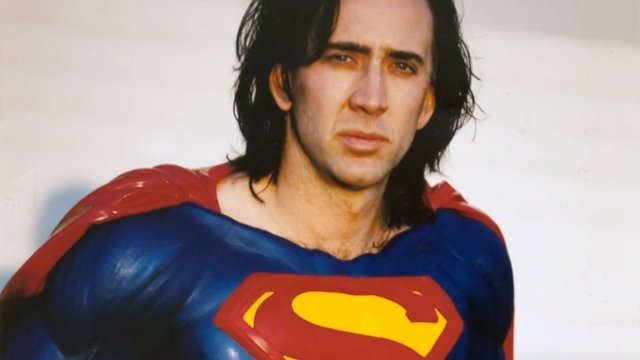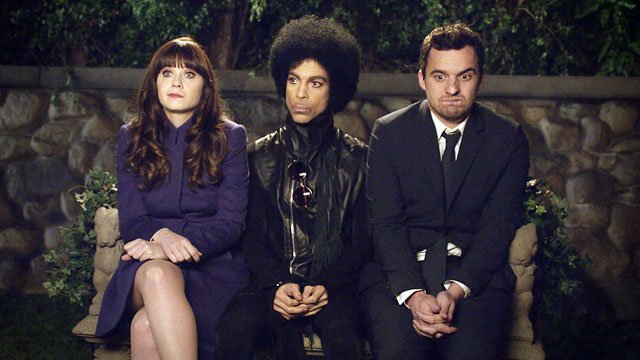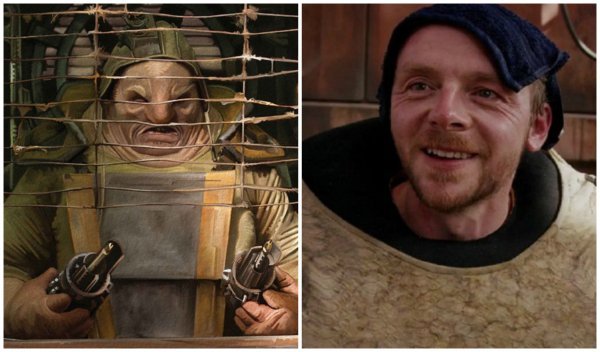You would also pretend to be a Chewbacca - when the creator is a fan.
Being a creator and being a fan are two categories that we like to distribute in our head. At the same time, after a deeper reflection - almost every creator must be a smaller or larger fan of what he does. After all, most filmmakers had to fall in love with cinema and writers sooner or later - find solace in books. No less usually we manage to separate the part of the fans quite well from those who can be the subject of love. But sometimes these two options overlap. It is worth asking yourself what happens then.
Recalling from the memory the entire lines of the dialogue from the Heat Tom Hiddleston should not surprise anyone. Eventually, the actor grew up on the same cinematography and pop culture as we did. Although most of us probably would not have taken the courage to recite dialogues from our favorite film if Robert De Niro was sitting next to him. No less such behavior is observed among actors - especially those from younger generations more often. A wonderful example is Jennifer Lawrence who beautifully represents the average consumer of popular culture, who is also a member of the film community, and is outside of it. Jennifer on the red carpet could be frightened at the sight of Damian Lewis from Homeland (because he is an actor from one of her favorite series), run away from Jeff Bridges and take great pictures with Bill Murray. And that's all a tip on an iceberg because when we compare her reaction to Emma Stone's tears and squeaks, for greetings were recorded by members of the Spice Girls - her beloved band from childhood (or youth). The actress was not able to stop the excitement, despite working in the entertainment industry from childhood. This type of reaction - usually attributed to fans - becomes more and more often the stars of the screen. Why? What can we calmly say that such a kind of fan reaction must have existed for a long time but actually now actors, celebrities have more channels to show their passion - they can take pictures on Instagram, catch their omnipresent camera and the talk show formula has changed so much that there is a place for Benedict Cumberbatch pretending to be Chewbacca in the front of Harrison Ford. Of course, in this case we are dealing with an interesting phenomenon of the so-called starstruck where the actors themselves - regardless of their current position in Hollywood - behave in the face of their cultural idols more or less the same as we once met them on the street. This behavior sells perfectly marketing (for a moment, turn on cynicism but only for a moment because I believe that most reactions are true) because it brings the actor (or any other creator) closer to the viewer - showing that he has the same predisposition to fan behavior.
One is the joy or excitement of meeting one fame with another. But sometimes it happens that being a fan impresses the creator's activity. A good example are people who work on Doctor Who - David Tennant and Peter Capaldi have been admirers of the show since their childhood. Tennant in one of his questionnaires filled up in his youth declared that the Doctor would be his dream role, Peter Capaldi wrote to the BBC on behalf of the Doctor Who Fan Club, so often that the BBC even has an internal note in which it suggests doing something to get rid of the annoying fan. Both Tennant and Capaldi ultimately played the role of the Doctor. Anyway, there were more such cases in the Doctor - from screenwriters (including the main screenwriter Moffat), guest authors (Neil Gaiman) and a number of other people involved in the series. The Doctor's uniqueness stems from its importance for British popular culture, no less shows how actors or creators willingly return to the project of which they were devotees. However, this is not the only example of fanpower which imprinted on a career. Another good example is Christopher Lee - a giant admirer of Tolkien's work who always wanted to play the Gandalf. When eventually started to filmed LOTR, he was too old for Gandalf, but it was clear that without him, it was impossible to film the work of Tolkien. Eventually, Lee played Saruman, which is responsible for a kind of renaissance of his career in the last decades. Interesting were the efforts of Nicholas Cage who wanted to play Superman - being his huge fan. The film was not finally made (there are pictures of Cage fitting the costume) but the proof of love for a super hero may be the fact that the actor called his son Kal-El (meaning the Kryptonian name Superman). Besides, this is not the only case of such sympathy for products of pop culture - Robin Williams not only advertised the game Zelda but also called that his daughter - in honor of the heroine of the computer game. Interestingly, in the case of Ryan Reynolds - whose efforts as a fan eventually led to the creation of a separate movie about Deadpool. Of course, the stories of the artist's great love do not always end well, Jeff Bridges has been asking for the screening of The Giver for years - but when the film finally came out on screen it turned out to be not very faithful to the novel and was an average movie.
Of course, the most interesting is when worship for a product of culture directly affects creative activities. Star Wars references - present in many texts that came out from under Simon Pegg's pen, and especially in the early Spaced - a result of actor and scriptwriter's love for the Lucas film series, Daren Criss made his fancy work (eg Very Potter musical) a pass to the world film and TV series. The last years hit series Sherlock was - as the urban legend says - from the purely fanatic reflection of Seven Moffat and Mark Gatiss over the possibility of transferring their favorite hero over time. Besides, both Moffat and Gatiss (especially the second one) had already declared love for Sherlock Holmes before their fan-made interpretation became a hit. In turn, Kenneth Branagh repeatedly talked about how amazing impression made on him when we watch Hamlet in youth with Derek Jacobi. Eventually, Jacobi became one of the actors, whom the director willingly invites to cooperation. One of the strangest cases (of which I have heard) in which being a fan influenced some thread was ... the appearance of Prince in New Girl. The singer appeared in one episode. It was only later that one could read that the singer had said earlier that he was watching only news and New Girl on television. And that he would like to play the part in the series. As you can see - if you are Prince, things happen by themselves. While writing this post I was also wondering if I should write what happened to Bridget Jones Diary and Colin Firth. The author of the book was undoubtedly a fan of the actor and his performance in the Pride and Prejudice. This in turn made the film's creators cast the actor in the film adaptation of the novel. What's more - the novel contains a chapter in which the protagonist makes an interview with Colin Firth and this part was also made (though it did not officially go to the movie). This is an interesting example of how the liking to the actor reflected on the final shape of the filming.
Fan behavior among celebrities can arouse various feelings. Sometimes we are absolutely afflicted - as when Vin Disel talks about Dungons and Dragons and we see that he is a man who really loves RPG. Sometimes they may seem to us as an element of image formation - we all like when our actors behave like us. And although I usually believe in outbursts of fan enthusiasm, I always remember it. This can be seen especially during promotional routes, where it turns out that all of us have been fans of directors, co-authors and source material for years. This happens regardless of whether we are filming a comic book or other work of popular culture. Sometimes these are true statements (we can assume that Olivia Munn has not planned for years that she will play in X-men and that way she was previously part of the geek culture) sometimes - hear a rustling of promotional stories that from childhood comics will make a life of passion.
What's interesting - the fact that the creators are fans (actually they are) does not necessarily affect the fan attitude during production. We can assume that this way of thinking about the starting material is pretty rarely present - it is beautifully presented by Bryan Fuller in Hannibal - taking over the full spectrum of fanatic behaviors. However, for the majority of fans / creators, it is more important to realize the selected project, sometimes being concerned with its faithfulness to the original. The phenomenon of the creator, who also creates a fan fiction (and this is Hannibal) is definitely rarer. What is more, they are often seen as a sign of disrespect for the original - I suspect that hardly anyone would call an extended version of Peter Jackson’s Hobbit fan of Tolkien, and yet, the director did what probably not one fan dreams. He recreated on the screen not so much what was happening in the novel but what he would like to see in it. At the same time, the contentment of the creator seems more important than the contentment of the viewer. Other creators / fans do not necessarily translate their passion for culture into professional life. Still other such fancy admiration may be disturbing - Anne Hathaway was right (in the same episode as Tom Hiddleston), that before it began to claim that she has scenes with Meryl Streep, the time of filming end. This is an interesting phenomenon - it's a meeting of actors from different acting generations. Where young actors actually grew up on the films of the people they work with now. No wonder that parts are difficult to accept that they work with people they admired or were fans.
As I wrote at the beginning - we can assume that every creator is somehow a fan. You can not create at the same time distancing yourself from the medium in which it is created (although sometimes I have the impression that some directors and writers do so). Being a fan and a creator at the same time seems to be absolutely charming, for some it will become the main way of functioning in popular culture as in the case of Felicia Day (with Supernatural). However, I have the impression that the fact that the creator may be a fan is not only a novelty but also raises contradictory feelings. Because it's so cool that they are like us. On the other hand - for many people this behavior of a fan is unprofessional or even compromising. I also have the impression that despite some fantasy that someone from "ours" may become one of "them", there is also a specific possessive attitude of fans towards their culture. A bit like you can make fun of that Martin Freeman is doing nothing but reviewing Tumblr (and you know he definitely looked there) but we do not necessarily want him to write a fan fiction or add his own fan of art to Sherlock. It would disturb some balance, and it would take the pleasure of feeling that we are playing with each other. Although it may only be my feeling. In any case, one thing is certain - although it's easy to divide creators and fans into two separate categories, they eventually overlap each other more often than we think. Which means that there is hope that we will also become serious creators sometime. And we will still be allowed to squeak.



I guess you're right. I like to read your posts, you have a perspective about the things that are interesting, and I also love The Graham Norton Show, probably the best celebrity show.
Thank you. That really kind, I like to write and this platform gave me a perfect opportunity to share my thoughts about many subjects, mostly about movies, books and the rest of the pop culture.
Posted using Partiko iOS